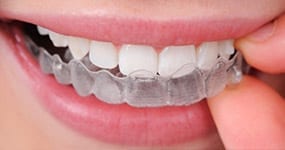Orthodontist vs dentist explained
Orthodontists and dentists both work to enhance their patients’ oral health – but they focus on different areas to achieve this.
Whereas dentistry is a broad medical field that encompasses the general care of teeth, gum, jaw and nerves, orthodontics is a specialty within dentistry that concentrates on facial development, bite correction and teeth alignment.
Below, we explain the key differences between an Orthodontist and dentist in detail so that you can understand which practitioner to visit depending on your concerns and treatment goals. Read on to learn more about an orthodontist vs dentist.
In which ways are orthodontists and dentists similar?
The roles of Orthodontists and dentists are a frequent point of confusion because both of these medical practitioners specialise in oral care.
Furthermore, they tend to work together throughout a patient’s dental journey, with Orthodontists encouraging regular dental checkups and referring General Dentists for routine dental care.
That said, it’s important to understand the critical contrasts between an orthodontist vs dentist so that you know who to turn to when faced with an issue related to your oral health or development.
Orthodontist vs dentist: what’s the difference?
Level of training
Under Australian law, both dentists and orthodontists are required to complete a General Dental Degree before beginning their career as a dentist. This university course takes four to five years.
If a dentist wishes to become an Orthodontist, they must return to university to undergo a three-year Specialist Orthodontic Degree after at least two years of working as a dentist. This hands-on experience helps to ensure that orthodontists understand both the theory and practices behind general dentistry before going on to specialise further.
Just five universities across all of Australia are accredited by the Australian Dental Council to deliver orthodontic training. Reviewed by the Australian Society of Orthodontists, these universities are:
- University of Sydney
- University of Melbourne
- University of Queensland
- University of Adelaide; and
- University of Western Australia.
Types of treatment
While there may be some overlap depending on your chosen practitioner, the nature of services provided by an Orthodontist vs dentist are inherently different.
In the same vein as your General Practitioner medical doctor, a dentist is skilled in diagnosing and treating a broad range of issues regarding the teeth, gums and mouth.
Performing both medical and cosmetic procedures for patients of all ages, dentists offer services including:
- Gum disease treatment;
- Tooth decay treatment such as fillings and root canals;
- Extractions;
- Veneers;
- Dental crowns and bridges;
- Dental implants;
- Emergency dentistry;
- Teeth cleaning;
- Teeth whitening; and
- General dental care and checkups.
In contrast to a dentist, an orthodontist specialises in facial growth and dental development, helping patients to achieve straighter teeth and aligned bites through treatments such as braces and Invisalign.
Typically, orthodontic services focus on addressing concerns such as:
- Crowded or crooked teeth;
- Gapped teeth;
- Poorly aligned jaws, such as underbites and overbites;
- Breathing issues;
- Chewing trouble;
- Temporomandibular disorder (TMD) treatment;
- Mouth or jaw pain; and
- Associated facial abnormalities.
Still not sure whether you should visit an orthodontist or dentist? Give our friendly team in Newcastle a call today on 1300 794 797 and we’ll be happy to point you in the right direction.
Can a dentist do orthodontics work?
While some dentists may offer limited orthodontic services, they can only be considered qualified orthodontists if they are registered as a specialist by the Dental Board of Australia.
When it comes to orthodontics, patients with similar symptoms may react to treatment differently due to personal variations in oral development and anatomy. Therefore, an Orthodontist must determine how each patient is responding to treatment throughout its course, often needing to adjust the approach accordingly. This vital skill is one of the key “Competencies and Proficiencies” required by the Dental Board of Australia to be registered as a specialist orthodontist.
Therefore, dentists tend to refer patients showing a need for orthodontic treatment to a qualified Orthodontist. The extra three years of specialist training mentioned above ensure these practitioners understand how to straighten teeth, as well as diagnose and treat issues of the face and jaw, safely and with unrivalled expertise.
To confirm whether your chosen practitioner is a qualified and registered Specialist Orthodontist vs a General Dentist, simply search for their name or location on the Orthodontics Australia database (Visit the listing for ABC Orthodontics here).
Do I need a referral from a dentist to visit an orthodontist?
Now that you know the difference between an Orthodontist and dentist, it’s time to figure out how these two practitioners fit together throughout the treatment process.
Here in Australia, you do not need a referral from a dentist to see an orthodontist. Instead, anyone with a relevant concern can book an appointment for orthodontic care as they wish.
Although a referral is not technically required, your dentist can recommend that you visit an orthodontist if they believe that such a specialist should assess and correct the development of your teeth or bite.
Furthermore, it’s important to understand that these two areas of oral health are not mutually exclusive. You should maintain regular dental appointments while undergoing orthodontic treatment, visiting your dentist at least every six months for a checkup and clean. Additionally, following a healthy diet and brushing and flossing your teeth twice per day will help you to flash a brighter smile when the braces come off.
Book an orthodontic appointment in Newcastle, NSW
Understanding the distinct roles of an Orthodontist vs dentist is important for your oral health and development. Although a dentist may be trained to provide basic orthodontic services in addition to general dental treatments, leaving your smile in the safe hands of a qualified orthodontist will ensure you receive the highest standard of care, no matter your needs.
Having undergone an additional three years of training relative to dentists, Orthodontists have the expertise to address crooked or crowded teeth, overbites, underbites, crossbites, gaps, jaw pain and more using specialised procedures and devices.
Ready to discover a full range of orthodontic treatment options in Newcastle, NSW? Please get in touch with ABC Orthodontics on 1300 794 797 to book an appointment with our friendly team today.


